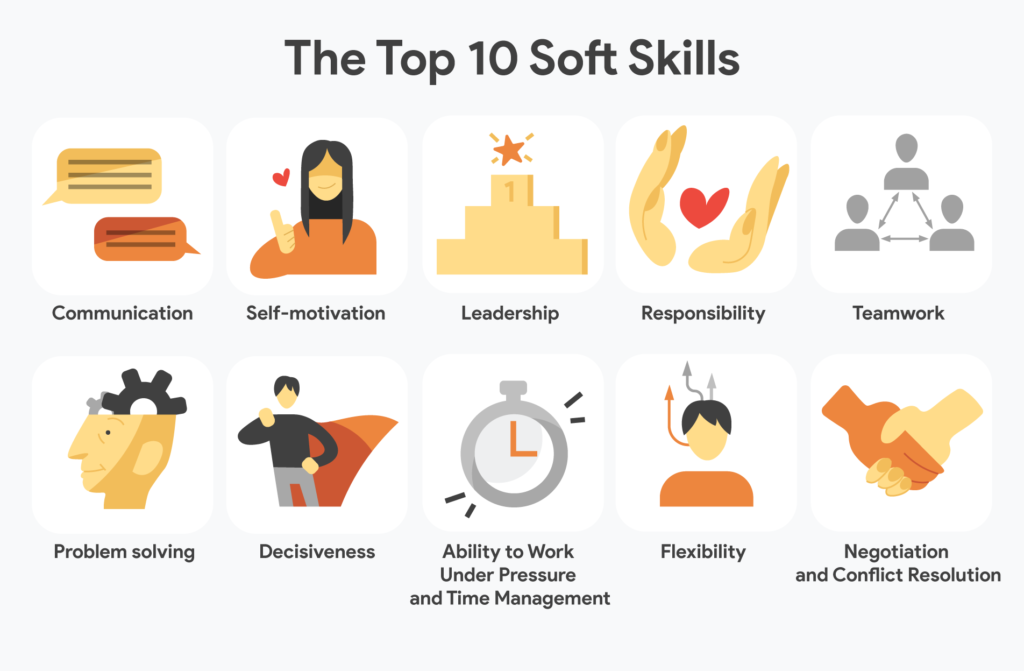How to Improve Your Soft Skills and Succeed in Your Career

Soft Skills
Why are soft skills important? What can you do to enhance yours? The following article will give you an overview of soft skills and tips for improving them. We will also look at some of the most important soft skills and provide examples of how they can help you in your career. Hopefully, you will find this information helpful!
Overview
One of the key elements to career success is demonstrating good soft skills. These skills are related to the way we relate to others and the way we work together. Organizations seek people who are flexible and willing to learn new things. Individuals with strong, soft skills have a higher chance of getting a promotion and experiencing growth on the job.
Solid communication involves active listening, comprehension, and the ability to read body language and social cues. Soft skills help people differentiate between a well-phrased statement and an overly long monologue. When people communicate effectively, they can achieve their goals, regardless of their expertise or experience. If someone is having trouble communicating effectively, they can improve their communication skills through coaching.
Soft skills can help you in many situations outside of the workplace. For example, you can use them to build friendship groups, meet prospective partners, and negotiate house renovations. They can even help you mentor your neighbour’s children. These skills are important in your professional and personal life and essential for career advancement.
Why are soft skills important?
Soft skills are a vital part of building a relationship with others. They are used daily, from negotiating a house renovation to building a friendship group. A good understanding of these skills will help you be more successful in your personal and professional life. You will stand out from the competition and have a more positive impact on others.
The modern workplace is changing dramatically. The old 9 am to 5 pm model no longer exists, and many organizations are moving towards flexible working hours. Employees are expected to take on work that best suits them and is actively encouraged to develop soft skills. Another important soft skill in the workplace is managing one’s mental health, which can be developed with the right training.
Soft skills are hard to measure, but they are important to a company’s success. The first indicator that soft skills help your business is increased employee engagement. Employees who feel engaged are more likely to stay in the company. Additionally, companies with a high employee engagement rate are twice as innovative and 26 per cent more profitable than their competitors.
How can I improve my soft skills?
Learning with others is one of the best ways to improve your soft skills. There are many ways to take advantage of social learning at work. For example, you can take a quiz to gauge your self-awareness, take the results, and list the skills you want to develop.
Identifying your strengths and weaknesses will help you develop your soft skills. For example, you will need to work on your flexibility if you have high neuroticism. You can also ask for feedback from your peers, managers, or mentors to identify your weak areas. Then, you can focus your efforts on improving the skills that matter.
Practising soft skills can be difficult, but it can help your career. These skills take time to develop. But they are crucial to your success in your career.
How can I improve my soft skills?
Learning how to improve your soft skills is essential to succeed in your professional career. Soft skills can be developed with training and mentorship, and you can also ask others to give you feedback on how you can improve. After you have learned about soft skills, you should start thinking about your personal goals.
Soft skills include the ability to communicate effectively and nurture personal relationships. Many businesses seek candidates with these skills to build a successful team. Try practising your soft skills with someone you trust. This will help you learn how to improve your social interactions and job performance. Practice making eye contact during a conversation and sitting up straight.
Learning to listen to others is essential for soft skills. Learn how to build rapport with your coworkers through genuine conversations and shared experiences. Take advantage of opportunities to go out for lunch as a team or department. It can be both fun and effective.
What are the seven essential soft skills?
Soft skills are not necessarily technical skills but rather personal habits and qualities that come naturally. They are not learned through formal education but are invaluable in nearly every industry. People with great technical skills can only be successful if they communicate effectively and demonstrate empathy. These are essential workplace skills that many employers are looking for.
Soft skills can enhance your productivity, work ethic, and job satisfaction and are also a good way to impress potential employers. To boost your soft skills, you should practice them outside your comfort zone. Try new things and ask for feedback. You should also update your cover letter and resume to highlight your soft skills. Lastly, be ready to communicate these skills during interviews.
You must develop rapport with other people and build trust as a leader. You can use appropriate communication skills, such as email etiquette. You must also develop a positive attitude and take the initiative, showing that you are reliable and committed to the cause. You can also inspire others by using these skills.
What are soft skills?
People use soft skills in the workplace to improve their productivity, work ethic, and job satisfaction. Developing them is a process that involves practice, measurement, and a willingness to learn new things. Identifying your soft skills can help you impress potential employers and achieve long-term success in your career. However, it would be best if you did not try to acquire every skill in the workplace – this is inefficient and may result in burnout.
To develop soft skills, you can look to have a mentor. This mentor can be either professional or personal and provide feedback and insight at key moments. However, if you don’t know anyone who can act as a mentor, you can watch and listen to those who impress you and learn from them. In addition, you can observe organizational hacks that other people use and apply them to your workstation.
Working collaboratively with others is an essential soft skill for most jobs. It allows team members to focus on a common goal and improve efficiency. In addition, it improves the work environment and creates a positive atmosphere.
What are the seven hard skills?
A job candidate must possess a specific set of hard skills in the business world. The hard skills include those that are measurable and teachable. In a technical field, hard skills relate to tools, equipment, software, and formal processes. They are the foundation of a successful career and ensure that employees can perform to industry standards. Hard skills can be learned through formal education, on-the-job training, or both.
If you’re applying for a creative job, hard skills include video editing, graphic design, and social media analytics. While these skills may not be required for engineering jobs, they can be extremely relevant for creative fields. Developing these skills can open the door to several opportunities and advancements. A hard-skills-focused approach will help you stand out from the competition and land the right job.
Having excellent communication skills is important in the business world. Team members should be able to express themselves clearly and communicate problems to their colleagues. Managers should be aware of any struggles their team members face and should help them work together to solve the problems. Having a solid knowledge of UX design can benefit the whole team by providing them with a better understanding of the customer base.
Conclusion
It’s important to have soft skills to succeed at work. A good soft skill set can help you shine in any industry and give you an edge over your competitors. This article will discuss the importance of soft skills and how they can improve your career and productivity. Continue reading for more information. We’ll also discuss how to measure soft skill output to ensure you get the most value from your training.
According to a survey, 85 per cent of employers attribute success to soft skills, whereas only 35% place high importance on professional skills. This gap exists even at the educational level. Many employers emphasize that a college or university cannot teach students all the skills necessary to be successful in the real world. Soft skills can be just as valuable as hard skills in employment.
While hard skills are the basic requirements for job functions, soft skills are crucial for a company’s success. Employees who are highly competent in soft skills are more productive and efficient than those who lack them. Soft skills are harder to develop than hard skills, but a good one can increase your career potential and help your company succeed.





